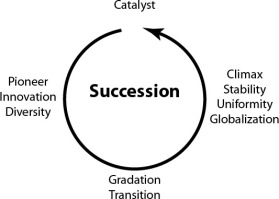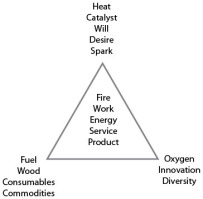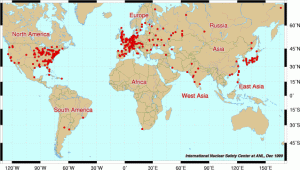Posted by David

Ecological/Economic Succession
Part 2, Part3
Ecologists speak of succession in terms of how a particular plant community evolves over time toward a climax system. All ecosystems grow under this process and I expect the same is true for economics and for civilization in general.
To see how this works, let’s first look at a forest ecosystem for example. The process of succession usually begins after a particular catastrophic event that clears the landscape. This might just be a local event such as a blowdown or an avalanche, or it might be broad in scope such as a fire, volcanic event, or emerging from a period of glaciation.
Initially, pioneer species populate the landscape helping to build up important nutrients such as nitrates, or structures, such as soil and habitat building blocks. This is the time of ‘innovation’. Diverse groups of plants, trees, animals and biota expand over the new landscape.
What follows is usually a succession of species that culminates in a fairly uniform, slow-growing community of species. At this point, innovation begins to collapse as the group of climax species become dominate and unchanging. This system is much less diverse than its initial pioneer stage. The species set stays the same until some catalyst returns the process back to the beginning state or climate or geography changes. In ecological succession, I argue that it’s actually the lack of diversity or the lack of innovation which is what ‘calls in’ the catalyst—maybe a fire—which returns the landscape to the beginning of the succession cycle.
Could civilization and economics be driven by the same process? I think so.
In society, initially innovation drives the changes and innovation creates the building blocks which allow the next stages of social and economic development. But finally, that innovation fades out, just like species diversity. Newness ends. It can’t go any further because all natural systems have limits. They hit their archetypal wall. They become what they were to become, or close to it. A Tsuga mensezii forest will only become a Tsuga mensezii forest unless the climate changes. That’s what it becomes. Cultures culminate into their archetype. The Maya, Astecs, Egyptians became a Pyramid building culture. This archetypal culture emerged out of man’s understanding of natural history and his development of math and the occult. It’s interesting to note that the pyramid describes perfectly the process of succession—more diverse at the base, less diverse at the zenith. Other cultures developed into their archetypes. Rome seems to be a special type that isn’t all that different than what we have today. Only ours is nested more firmly in advanced technology.
In our global industrial civilization we are walking along the same successionary process as forests follow. Innovation builds the society and lack of innovation will bring our decline. I argue that innovation has truly peaked in our global society. I remember seeing a boy with a shirt on in southern Argentina in 1998, which read in English, “Know no limits—Mountain Dew.”
Yes, there are still minor innovations in science and culture…but we’ve hit the wall. We will know our limit. And I think we’ve been at the peak for a number of years now. The question for me becomes how long can we last at this final climax stage? A Tsuga mensezii may last hundreds of years in the climax stage.

Fire triangle
The succession process and growth of an ecological community is very much like a fire. It runs under the same process. Take fire triangle for example. For a fire to burn, it needs fuel, oxygen, and heat. Without either of the three, fire cannot happen. Likewise, for a civilization to grow it needs fuel, innovation, and desire. Without either of the three, it collapses. Could it be that they all three occur at once? Do they feedback on one another: Lack of fuel lowers desire which lowers innovation. Lack of innovation decreases desire, which limits the amount of available fuel. You get the idea. In our civilization, you might call it Peak Oil, Peak Innovation, or Peak Desire. Whether the chicken, the egg or the chicken pellets came first doesn’t matter. The peak occurs and then the civilization fades or collapses.
But what can we learn about the catalyst that initiates fire at the end of the forest succession process? As energy goes into a system if it’s not being put into innovation, it is being stored elsewhere, dry wood, fuel, lack of diversity, cranky people, etc. Eventually, that dry wood, those cranky people, become the fuel for the fire. I argue that it’s the accumulation of fuel that actually draws in the lightning, but how it happens isn’t important to this argument.
I mentioned “cranky people,” but I’m not really kidding. It’s those cranky people that help to dissolve society. They and their lack of innovation is the precursor to civil war or revolution.
The same is the case for our present society and economic reality. Energy is always entering the system, but when it stops flowing into innovation, it starts being stored up in the people, and even the products to some extent. The energy becomes ripe for the fire that causes its decline. The energy is what feeds the fire. When it builds up great enough, there will either be an event that is the spark that causes its destruction. Some people call these “black swan” events.
He also said to the disciples, “There was a rich man who had a manager, and charges were brought to him that this man was wasting his possessions. And he called him and said to him, ‘What is this that I hear about you? Turn in the account of your management, for you can no longer be manager.’
Luke 16:1-3
























